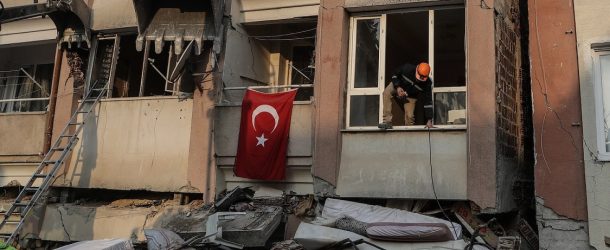Introduction
Türkiye (Turkey) as a nation has been suffering since 6 February 2023, when two devastating earthquakes hit the country’s southeastern cities. Centered in Kahramanmaraş, the disasters demolished 10 Turkish cities including Kahramanmaraş, Hatay (Antakya), Osmaniye, Adıyaman, Gaziantep, Kilis, Şanlıurfa, Diyarbakır, Malatya, and Adana. According to official statistics, approximately 41,000 people lost their lives due to the disaster. However, the death toll could reach 50,000 to 100,000 in the coming days considering the fact that many people’s bodies are not yet discovered in ruins. In this article, I am going to summarize the outcomes of the devastating “twin earthquakes” in Türkiye and Syria and discuss whether it could lead to a postponement of the 2023 elections.
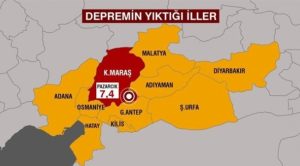
10 Turkish cities demolished after the twin earthquakes
Outcomes of the Tragedy
This great tragedy not only disrupted the normalcy of life in Türkiye, but also terribly affected the general psychology of the nation. State of emergency was declared for 3 months in these 10 cities. Turkish people initiated aid campaigns and ten thousands of volunteers went to these cities to help rescue efforts. As a normal reaction, Turkish media began to cover almost only earthquake stories and all other issues are forgotten. Miraculous rescues from wreckages after long hours created bliss, whereas pictures of death bodies and demolished cities caused despair. Famous Geology and Geophysics Professors (Celal Şengör, Şener Üşümezsoy, Ahmet Ercan, Naci Görür, Cenk Yaltırak etc.) began to appear on Turkish tv channels similar to 1999 Gölcük (Izmit) earthquake. The country’s risks due to earthquakes, especially the situation of Istanbul where almost 20 million people reside and the country’s economy is based, is largely spoken on tv channels. Some of these Professors focused on an imminent threat, whereas some others underlined that there is no real risk of collapse for Istanbul in the short or medium run.
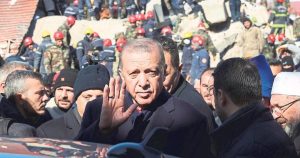
President Erdoğan visited the region and tried to tranquillize people
The negative economic effects of the disaster on the other hand will be better understood in the coming years since the state will allocate millions of dollars for the reconstruction of these cities as well as the caring of earthquake victims. Turkish President Recep Tayyip Erdoğan promised to rebuild all residences and resettle people into their homes in a year. However, realistically speaking, fulfilling this promise could be impossible since Turkish economy was already in crisis before the earthquake and Turkish people’s purchasing power has been falling constantly in the last few years. With the twin earthquakes, the recovery could be even harder for Turkish economy, if not impossible. So, Türkiye needs more time to relieve and dress the wounds.
The only positive outcome of the disaster was the incredible solidarity shown by Turkish people and many other countries who contributed to rescue efforts and aid campaigns. Countries who helped Türkiye during this process are: Albania, Algeria, Argentina, Armenia, Australia, Azerbaijan, Bangladesh, Belarus, Bosnia Herzegovina, Brazil, Bulgaria, Croatia, Czechia (Czech Republic), El Salvador, Estonia, Finland, France, Germany, Georgia, Greece, Hong Kong, Hungary, India, Iraq, Islamic Republic of Iran, Israel, Italy, Japan, Jordan, Kazakhstan, Kosovo, Kuwait, Kyrgyzstan, Lebanon, Libya, Lithuania, Malaysia, Malta, Mexico, Moldova, Mongolia, Montenegro, Netherlands, Pakistan, Palestine, People’s Republic of China, Poland, Portugal, Qatar, Romania, Russian Federation, Saudi Arabia, Serbia, Slovakia, South Korea, Spain, Sweden, Switzerland, Tajikistan, Taiwan, TRNC (Turkish Republic of Northern Cyprus), Tunisia, Turkmenistan, Ukraine, United Arab Emirates (UAE), United Kingdom, United States of America (USA), Uzbekistan, and Venezuela. Especially Israeli, Greek, and Armenian help during this process were largely covered by Turkish and international media since Türkiye has some traditional political-diplomatic problems with these countries. This process proved that there is still chance for a rules-based and solidarity-oriented international order especially in times of crises and countries are not existential threats to each other.
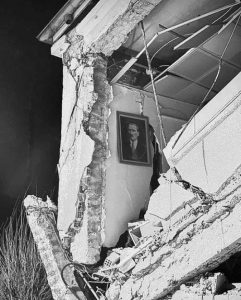
A scene from the wreckage
2023 Turkish Elections: Could There Be A Postponement?
The terrible disaster hit Türkiye just a few months before the critical elections; Türkiye was normally heading towards a joint presidential and parliamentary elections on June 18, 2023. Turkish President Recep Tayyip Erdoğan previously declared his wish to hold the elections on May 14, 2023, the historic date/anniversary of Turkish transition into multiparty democracy back in 1950. However, due to negative effects of this unexpected disaster, which led to the relocation of millions of people into different cities in addition to infrastructural problems, now there are talks in Turkish mainstream politics whether these elections should be postponed or not.
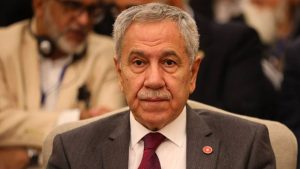
Bülent Arınç
For instance, very recently, one of the top figures of the ruling AK Parti (Justice and Development Party) and former speaker of the Turkish Parliament Bülent Arınç demanded the postponement of the elections. This was largely understood by the Turkish people as an effort of kite flying to observe the reactions of the opposition. It is a fact that terrible twin earthquakes changed the demographics of Türkiye considerably and many people should be re-registered to electoral roll in different cities in the coming months. In fact, even the number of parliamentarian seats allocated to cities on the basis of population could be changed due to large resident mobility. However, due to ongoing polarization in domestic politics, the opposition could perceive this as an effort to steal the election. That is why, although I admit the fact that a disaster of this size would normally result in the postponement of the election in a regular democratic country, due to Türkiye’s extremely high polarization in domestic politics and leaning towards authoritarianism in recent years, it might be a wiser decision to make the elections on time. The opposition by the way already rejected a possible postponement.
Moreover, there could be problems related to the constitutionality of the postponement decision. Turkish constitution does not allow any delay for the elections unless the country is engaged in a war. Article 78 of the constitution clarifies the issue as follows: “If holding new elections is deemed impossible because of war, the Grand National Assembly of Türkiye may decide to defer elections for a year. If the grounds do not disappear, the deferment may be repeated in compliance with the procedure for deferment.” Mr. Arınç responded to this fact by simply saying that “constitutions are not sacred texts“. Many legal experts on the other hand claim that delaying the election would not be constitutional and Türkiye’s Supreme Electoral Council or Supreme Election Committee (Yüksek Seçim Kurulu-YSK) does not possess such a right/privilege.
Honestly speaking, what I smell out in the street is that, President Erdoğan might try to postpone the election for several months by using a YSK decision stating that voter rolls are not ready yet and the institution in charge needs more time to organize new registrations. This happened once in Turkish political history before and in 1966, YSK decided on the postponement of the mukhtar election in Varto district of Muş. However, the earlier decision was about the mukhtar election, now this is about the whole country. Osman Can, a prominent Professor on Constitutional Law, states that “YSK could track the voters if they relocate since we have a very modern system of registry that could be updated, and most importantly we have more than three months until the elections, we have time” and underlines the unconstitutionality of the postponement decision. Professor Hasret Çomak from Istanbul Kent University also underlines that YSK does not have any right to delay the election. But as President Erdoğan is the only wirepuller in the country since the failed coup attempt in 2016, I think he might prefer the postponement of the election in order to gain more time and to focus on rebuilding efforts as well as the recovery of the economy.
The Candidate of the Opposition: Kılıçdaroğlu Makes Important Gains
In addition to these developments, with his increasing activism in recent months, pro-secular CHP’s (Republican People’s Party) leader Kemal Kılıçdaroğlu gains popularity among people. Kılıçdaroğlu immediately went to demolished cities after the earthquake and tried to articulate the feelings of victims. He showed a good leadership skill during the disaster although his harsh criticism towards President Erdoğan and to the government was perceived “untimely” by some. Belonging to Alevi faith and coming from Kurdish/Zaza background, Kılıçdaroğlu’s chance to win the election is often considered very low until now in a Sunni-Turkish dominated conservative/nationalist society. However, due to terrible economic situation of the country, the unsuccess of the crisis management of the government during the disaster and his rising performance, in my opinion, Kılıçdaroğlu could now defeat Erdoğan in a presidential race.
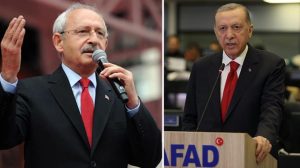
Probably, Kemal Kılıçdaroğlu and Recep Tayyip Erdoğan will contend against each other in the Presidential election
Kılıçdaroğlu’s candidacy could be announced in the coming weeks if the election is not postponed. Kılıçdaroğlu has already the support of his party (CHP) and many other small parties (center right Democrat Party-DP, Ahmet Davutoğlu’s Future Party/Gelecek Partisi, Ali Babacan’s DEVA, and Islamist Felicity Party/Saadet Partisi). The only missing support given is Good Party (İYİ Parti) leader Meral Akşener’s. If Kılıçdaroğlu could convince Akşener as well, he will be the next Presidential candidate of the opposition bloc. I think he has very high chances now to win the election although before six months, he was not such a strong candidate. That is because -as Soner Çağaptay mentions– the government showed a real slow and uncoordinated response to the earthquake disaster and Kılıçdaroğlu gives strong promises to end the corruption in the country.
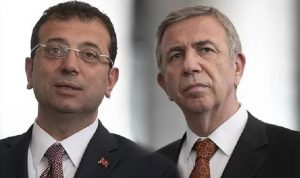
Ekrem İmamoğlu and Mansur Yavaş
But Istanbul mayor Ekrem İmamoğlu and Ankara mayor Mansur Yavaş also still have chances to become the presidential candidate of the opposition. İmamoğlu was recently tried to be temporarily banned from active politics by a court decision, but the appeal process continues. İmamoğlu is a rising star of Turkish politics, but since his candidature could be risky in legal terms, he could wait for his time for CHP leadership and Prime Ministry in the coming years after Türkiye returns to parliamentary system. Yavaş on the other hand comes from Turkish nationalist MHP (Nationalist Action Party) background, a fact that might alienate traditional CHP voters and Kurds from the opposition. Moreover, these two municipal leaders are very successful in their jobs and Türkiye definitely needs successful administrators to develop and protect itself from natural disasters such as the earthquake.
Conclusion
Finally, 2023 Turkey-Syria earthquakes was one of the biggest disasters recorded in modern history. However, as a very strong country, Türkiye already began to recuperate and it will continue to develop in the coming years to become a regional power. In that sense, Türkiye’s rise is unstoppable due to its young and dynamic population and developed status in many industries.
In the coming days, President Erdoğan and his team might try to postpone the elections due to earthquakes. Although there are very justifiable arguments for such a decision, as far as I am concerned, that would not be wise and it will further increase the polarization within the country. However, in case YSK and the government convince the opposition for a short term delay only for arranging the electoral facilities and voter rolls, there could be a few months postponement.
Lastly, in my opinion, Türkiye has to celebrate its 100th year anniversary with a democratic presidential and parliamentary election in 2023 and it should start setting a new course for the future.
Assoc. Prof. Ozan ÖRMECİ


